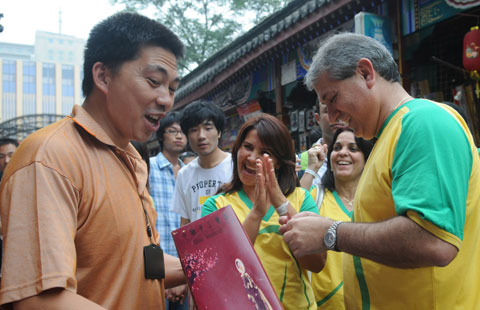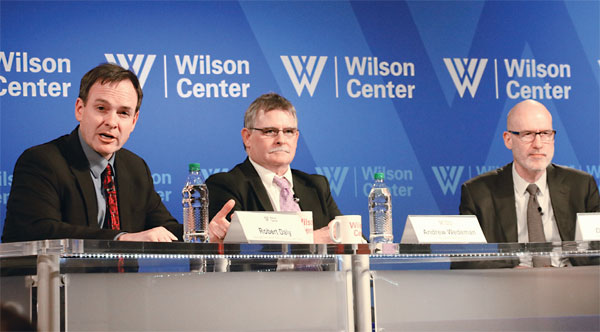Anti-corruption move gains traction
Updated: 2014-11-26 12:07
By Chen Weihua in Washington(China Daily USA)
|
||||||||
|
From left: Robert Daly, director of the Kissinger Institute on China and the United States at the Wilson Center; Andrew Wedeman, professor of political science at the Georgia State University; and Donald Clarke, a professor at the George Washington University Law School; talk about the anti-corruption campaign and the Fourth Plenum of the 18th Party Central Committee and its implication for US-China relations at the Wilson Center on Tuesday. Chen Weihua / China Daily |
The strengthening of the anti-corruption campaign in China and the rule of law emphasized at the Fourth Plenum of the 18th Communist Party of China Central Committee last month has continued to draw an overall positive response from US experts.
Stapleton Roy, a former US ambassador to China, described the message coming out from the plenum a "positive step in the right direction".
"Most Americans don't understand this process well enough," Roy, now a distinguished scholar at the Kissinger Institute on China and the United States at the Wilson Center, told China Daily on Tuesday on the sidelines of a talk on the anti-corruption campaign and the Fourth Plenum.
Roy, however, said there was still some concern about whether it is rule of law or rule by law in China.
The 4th plenum, held on Oct 20-23, announced a blueprint for rule of law by promising sweeping judicial reforms and upholding the overarching role of the constitution in the country's legal system.
Robert Daly, director of the Kissinger Institute, said many American writers focused on what was not in the 4th plenum documents from the American point of view and often didn't focus on the many proposed changes that were there.
Donald Clarke, a professor at George Washington University Law School, said there are a lot of meaningful and positive things regarding legal system reform in China. "There are some meaningful major reforms," he said in a talk at the Wilson Center in Washington.
Clarke, an expert on China's legal system, praised China's bid to establish a career civil service model for the judiciary, such as the promotion of junior judges to higher level courts. "This is very significant," Clarke said.
"There is not now a system of identifying good low-level judges and promoting them to high-level judges," he said, adding that there is no such system in the US either.
Andrew Wedeman, a professor of political science at Georgia State University, has been following China's anti-corruption campaign for 18 years. He said Chinese President Xi Jinping is really serious about wanting to fight corruption.
"This campaign is two years old. For two years I keep expecting it to begin to wind down. And for two years I have been wrong one time after another," Wedeman said at the talk.
"Some suggested that this campaign is the new normal, that in fact this campaign will just keep going on and on," he said.
Wedeman said if the campaign does continue, it may have the positive effect of keeping up pressure on officials to be more careful.
Wedeman does not expect corruption in China to go away anytime soon and reminded the audience that the US had its own problems around the time of the Civil War.
"We were serious about fighting corruption in about 1870. Guess what? We are still fighting it," he said, citing the recent case in which former Virginia Governor Bob McDonnell and his wife Maureen were indicted and convicted on federal corruption charges.
To Wedeman, the current war on corruption in China actually started in 1982, and it has continued for three decades. "I expect it will continue for quite some time," he said.
While Wedeman believes the anti-corruption campaign now seems to be both political and principled, he believes it will be more principled in the long run.
In an op-ed piece in the New York Times last month, Paul Gewirtz, a Yale University Law School professor, said that the Chinese government led by Xi has already signed on to many reforms and even adjustments in ideology that represent positive steps toward a modern system of rule of law.
"These changes aren't just window-dressing; they reflect the leadership's recognition that it needs to improve governance, address widespread public grievances and respond to public opinion," he wrote.
Gewirtz also cited some legal reforms in China in the last few years, including use of the death penalty being cut roughly in half and improved procedures for deciding on its use. He also cited the new criminal law that provides significantly more protections to suspects and defendants and abolishment of the "re-education through labor" system.
"A sea change has taken place in government transparency, with important requirements of open government information changing the relationship between the state and the citizens," he said.
chenweihua@chinadailyusa.com

 The plight of pregnant women in rural China
The plight of pregnant women in rural China
 Rescue dogs show skills in NW China
Rescue dogs show skills in NW China
 Top 10 largest hotel chains in China
Top 10 largest hotel chains in China
 10 'mosts' about foreigners in China
10 'mosts' about foreigners in China
 DreamWorks-themed ice sculpture festival kicks off in Macao
DreamWorks-themed ice sculpture festival kicks off in Macao
 Folk art shines at East China fair
Folk art shines at East China fair
 Goodbye, my brothers!
Goodbye, my brothers!
 9 global hubs for renminbi trading
9 global hubs for renminbi trading
Most Viewed
Editor's Picks

|

|

|

|

|

|
Today's Top News
Microsoft reported to be facing $137 million bill for back taxes
Partnership with private firms fuels China's growth
BMO Global Asset Management Launches ETFs in Hong Kong
BlueFocus aims to acquire Canadian company
Anti-corruption move gains traction
Maryland's new first lady thankful
Amazon answers China's 'Double 11' with Black Friday
Tencent-HBO deal can feed big appetite for content in China
US Weekly

|

|








